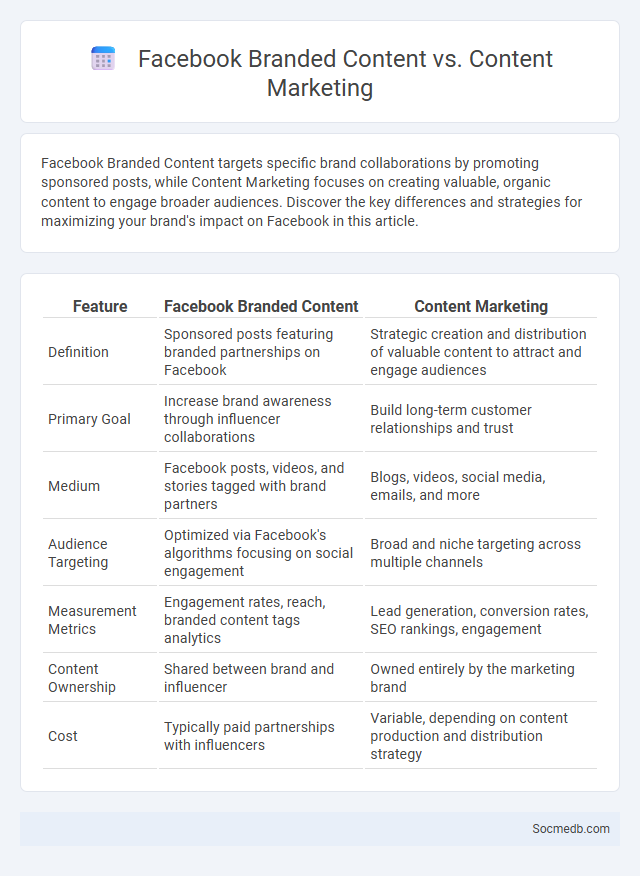
Photo illustration: Facebook Branded Content vs Content Marketing
Facebook Branded Content targets specific brand collaborations by promoting sponsored posts, while Content Marketing focuses on creating valuable, organic content to engage broader audiences. Discover the key differences and strategies for maximizing your brand's impact on Facebook in this article.
Table of Comparison
| Feature | Facebook Branded Content | Content Marketing |
|---|---|---|
| Definition | Sponsored posts featuring branded partnerships on Facebook | Strategic creation and distribution of valuable content to attract and engage audiences |
| Primary Goal | Increase brand awareness through influencer collaborations | Build long-term customer relationships and trust |
| Medium | Facebook posts, videos, and stories tagged with brand partners | Blogs, videos, social media, emails, and more |
| Audience Targeting | Optimized via Facebook's algorithms focusing on social engagement | Broad and niche targeting across multiple channels |
| Measurement Metrics | Engagement rates, reach, branded content tags analytics | Lead generation, conversion rates, SEO rankings, engagement |
| Content Ownership | Shared between brand and influencer | Owned entirely by the marketing brand |
| Cost | Typically paid partnerships with influencers | Variable, depending on content production and distribution strategy |
Understanding Facebook Branded Content
Facebook Branded Content allows creators and businesses to collaborate by publishing posts that clearly identify the brand connection, enhancing transparency and trust with audiences. This feature supports targeted advertising through detailed insight metrics, enabling precise measurement of engagement and reach for sponsored posts. Utilizing Facebook's branded content tools helps optimize influencer marketing strategies while complying with platform policies and increasing brand authenticity.
Defining Traditional Branded Content
Traditional branded content refers to marketing materials created by companies to promote their products or services through established media channels such as television, radio, print, and direct mail. These content pieces prioritize brand messaging and storytelling to build awareness, trust, and loyalty among target audiences. By integrating logos, slogans, and consistent visual identity, traditional branded content ensures brand recognition and reinforces the company's core values across multiple marketing platforms.
Content Marketing: An Overview
Content marketing leverages social media platforms to distribute valuable, relevant, and consistent content that attracts and engages target audiences. Effective strategies include creating shareable posts, videos, and infographics tailored to platform algorithms and user behavior insights. Measuring content performance through analytics tools helps optimize reach, conversion rates, and brand loyalty.
Key Differences Between Branded Content and Content Marketing
Branded content primarily aims to build brand awareness by creating engaging, story-driven media that subtly incorporates the brand's identity, whereas content marketing focuses on delivering valuable and relevant information to attract and retain a clearly defined audience. Branded content often appears as entertainment or storytelling that fosters emotional connection, while content marketing emphasizes educational or problem-solving material that drives customer action. Social media platforms amplify the reach of both strategies, with branded content leveraging native advertising techniques and content marketing utilizing SEO and targeted distribution to maximize engagement and conversion.
Facebook Branded Content: Unique Features and Guidelines
Facebook Branded Content offers unique features such as taggable business partners and integrated shopping tags, enabling creators to collaborate transparently with brands while promoting products directly within posts. Guidelines require clear disclosure of brand partnerships by using the Branded Content tool, ensuring compliance with Facebook's Advertising Policies and maintaining authenticity. These features facilitate enhanced audience trust and improved campaign performance through precise targeting and analytics.
Content Distribution Strategies on Facebook
Maximizing your reach on Facebook involves strategically scheduling posts during peak engagement times and using Facebook's native tools like Groups, Pages, and Stories for targeted distribution. Leveraging Facebook's algorithm by prioritizing video content and interactive posts such as polls or live streams significantly boosts organic visibility. Your content gains momentum by consistently analyzing audience insights and refining distribution tactics to match evolving user behavior.
Measuring Success: Metrics for Each Approach
Measuring success on social media involves tracking key metrics tailored to each approach, such as engagement rate, follower growth, click-through rates, and conversion rates. For content marketing, metrics like shares, comments, and time spent on posts are critical indicators of audience resonance. Your ability to analyze these data points determines the effectiveness of your social media strategy and guides ongoing optimization.
Pros and Cons: Facebook Branded Content vs Content Marketing
Facebook Branded Content offers targeted audience reach and enhanced brand credibility through influencer partnerships, driving immediate engagement and authentic connections. Your content marketing, however, builds long-term brand loyalty and SEO value by creating consistent, original content tailored to your audience's needs. While Facebook branded content requires budget and influencer reliance, content marketing demands time and resources but fosters sustainable growth and organic reach.
When to Use Branded Content vs Content Marketing
Branded content is ideal when you want to increase brand awareness by creating engaging stories that resonate emotionally with your audience, while content marketing focuses on providing valuable information to educate and convert potential customers. You should use branded content on social media platforms to build trust and brand loyalty through authentic storytelling, whereas content marketing performs best for driving traffic and generating leads with targeted blog posts, videos, and infographics. Choosing the right approach depends on your campaign goals and how you want your audience to perceive and interact with your brand.
Best Practices for Integrating All Three Approaches
Integrating social media strategies through content marketing, paid advertising, and organic engagement maximizes reach and fosters authentic interactions. Utilize targeted ads to amplify high-quality, relevant content while engaging users through consistent community management and real-time responses. Monitoring analytics across these approaches ensures continuous optimization and alignment with audience preferences for sustained growth.
 socmedb.com
socmedb.com